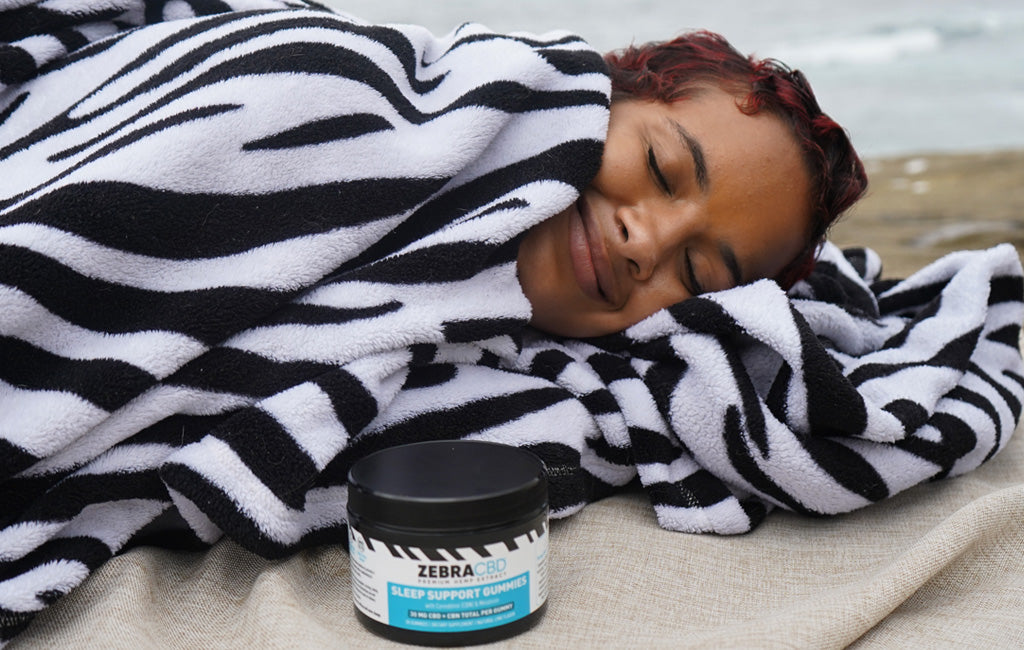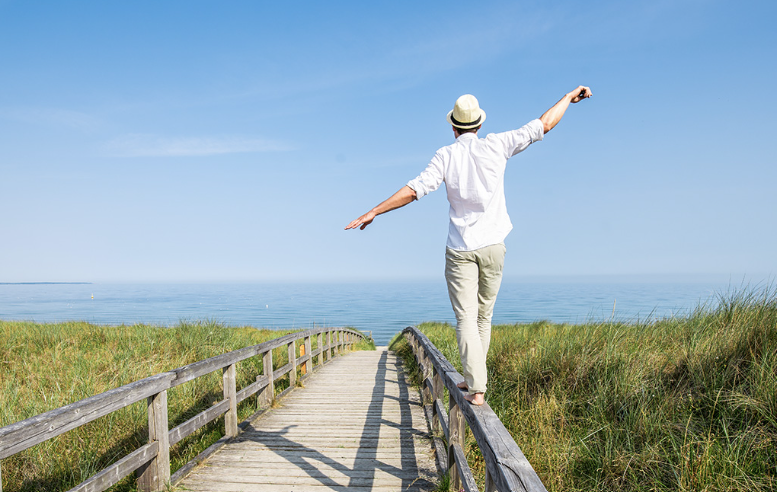
Experiencing sleep trouble? We’ve all been there — tossing and turning in the sheets, counting flock after flock of sheep, watching helplessly as our sleepless nights turn into weary mornings.
Whether you’re losing sleep over too much caffeine, a stressful situation, next-door neighbors with a looser understanding of quiet time, and other sleep disturbances, you know that a lack of healthy, restful shut-eye can leave you feeling run-down, exhausted and hopeless.
But you aren’t alone — in fact, more than 60 million Americans suffer from poor sleep quality — and there might be a way to defeat those tired days and restless nights, naturally.
So before you give in, grab another cup of coffee and begin the sleepless cycle all over again, take a look below. We’ll explore some natural sleep remedies and routines. We’ll also discuss cbd sleep products like CBD oil, CBD tablets and (cbd oil balm), which you might want to try this month that may help you slumber more soundly.
#1 Exercise
Just like Windex in My Big Fat Greek Wedding, exercise has been touted by many as a natural remedy for just about anything — blue moods, low energy and even sleepless nights.
But experts agree that working out may do more than help us greet our days with increased strength and stamina — it may also help us fall and stay asleep.
According to Charlene Gamaldo, MD, medical director of Johns Hopkins Center for Sleep, we don’t quite know howphysical activity enhances the quality of our sleep, just that it does.
Gamaldo speculates that exercise’s potential to boost mood and help us decompress from our days might be part and parcel of its sleep-enriching power, as it tends to be much easier to doze off when we’ve reached a stable, worry-free headspace.
Exercise might play an important role after we have fallen asleep, too. Researchers have found that even 30 minutes of moderate aerobic activity can increase your slow-wave or deep sleep — a restorative, rejuvenating time for your body and brain. Just make sure you research how to get rid of soreness after exercise as well.
If you’d like to explore the deep sleep-boosting promise of exercise but aren’t quite ready to run marathons or climb mountains, take heart. Moderate aerobic activity includes:
- Brisk walking
- Dancing
- Gardening
- Biking
- Water aerobics
Tip: Timing is Everything
Exercise might help us alleviate sleep issues and reach deep, restorative sleep, but it also carries the potential to shift our body chemistry and make us feel more awake, thanks to:
- Endorphin release – Physical activity releases these “feel-good” chemicals, which might give your brain a euphoric buzz (and make it harder to hit the hay).
- Changes in body temperature – Exercise can raise the core temperature of your body, signaling to your body that it’s time to seize the day.
To take advantage of the benefits of exercise — and avoid the possibility of spoiling your slumber — try working out at least one to two hours before you head to bed and make sure you also do proper cool-down exercises as well. Doing this is also one of the ways on how to prevent muscle soreness.
#2 Melatonin
Melatonin, a naturally occurring hormone, works the night shift in our bodies: rising in the evening and in the dark, preparing us for the restful hours ahead.
While it doesn’t make us sleep, melatonin plays an important role in managing our circadian rhythm — or body clocks — and clueing us in that it’s time to go to bed.
Scientists noted the profound impact of melatonin on sleep when studying a group of zebrafish with a rare mutation that inhibited their hormone levels. The fish suffered from deeply diminished levels of sleep, even though their environment was suitably dark.
So, it’s possible to infer that low melatonin might make us ill-suited for sleep, and an extra dose might help us to doze off. And while we do produce melatonin naturally, unlike those restless zebrafish, some of us could use a little extra help setting the sleepytime mood.
Melatonin supplement might be an appropriate option if you:
- Experience jet lag – If you’re crossing time zones and facing the all-too-common consequences of tiredness, digestion delays and changes in your sleep patterns, melatonin might help. Studies have shown that taking a melatonin supplement can improve sleep quality and soothe the symptoms of jet lag.
- Can set the scene – If you’re interested in boosting your melatonin, experts suggest that you can set yourself up for success by creating a nighttime ritual that empowers the hormone to shine. That means turning off the television and putting away the tablets, phones and computer screens. They emit blue and green light that can neutralize the hormone’s relaxing impact.
- Know what you’re working with – Experts suggest you begin your journey with the natural supplement with baby steps. Johns Hopkins sleep expert Luis F. Buenaver, Ph.D., suggests starting with low doses, two hours before bedtime.
#3 Valerian
People have used valerian roots as a natural sleep aid— a tall, flowering herb native to Asia and Europe — for centuries to calm nervousness and irritability, soothe cramps and aid sleep.
While this natural remedy has a strong, earthy smell that might resemble that of your gym bag, valerian root has chemical compounds that might bolster your tranquility and make it easier for you to tuck in for the night.
Valerian and Stress
Dubbed “nature’s Valium,” valerian root has also shown promise as a means of combating physical and mental stress, which might degrade sleep quality.
A study from 2014 found that mice who were administered valerian extract were able to maintain their levels of the good-mood hormone serotonin, despite the stressful nature of their environment.
If you’re experiencing stressful days that lead to sleepless nights, calming valerian may play a positive role in your nighttime routine by helping you wind down.
Valerian and Sleep
Experts suggest that valerian might boost healthy slumber as it contains sedative, sleep-boosting antioxidants and helps reduce the breakdown of gamma-aminobutyric acid (GABA), which can cause poor sleep quality. Valerian may help:
- Sleep latency – Research suggests the extract might significantly shorten the time between going to sleep and falling asleep.
- Sleep quality – Self-identified poor sleepers reported better sleep, and shorter latency periods, after consuming valerian
Tip: Be Consistent
If you’d like to try valerian to have a good night’s sleep, consistency is key. You might find that it is more effective after two weeks of regular use. You can find valerian root in capsule form or in gummies, but if you prefer to add some ritual to your routine (and can get past the earthy taste), you can steep valerian root in hot water for 10 to 15 minutes and enjoy it as an herbal tea.
#4 Meditation
Meditation is an age-old practice that involves consciously focusing your attention on breath, sounds, images or words to boost relaxation, awareness and calmness.
It may also be a natural, cost-effective way to promote healthy, restful sleep. Research has suggested that mindfulness meditation, a type of meditation that focuses on the present moment, actually improves the quality of sleep in adults.
To help you unwind before bed, you might want to try these other forms of meditation:
- Visualization – Lull yourself into a serene slumber by visualizing a peaceful, soothing scene. Allow yourself to get lost in the details, imagining the sounds, sights and scents that surround you.
- Breathwork – Engage a tranquil mindset by practicing deep breathing techniques like box breathing. It’s as simple as breathing in a while counting to four and breathing out while counting to four, and can help you set the stage for slumber.
#5 CBD
Still in search of a good night’s sleep? Cannabidiol (CBD), a non-impairing compound from cannabis and hemp plants, might be able to help you, thanks to:
- CBD’scalming effect and blues-busting properties – Organic CBD may help you put the stresses of the day to bed before you go to bed.
- The sleep-boosting potential of CBD – The endocannabinoid system helps the body regulate sleep through the circadian rhythm or your sleep-wake cycle. Many experts believe that CBD interacts with the endocannabinoid systems and may prevent endocannabinoids from being broken down, which can encourage a regular, restful slumber.
Zebra CBD: When You’re Tired of Losing Sleep
If you’re tired of tuckered-out days, Zebra CBD is here to help. We know that restorative, rejuvenating sleep is a critical part of your overall wellness. That’s why we’ve crafted premium CBD products designed to help support good sleep, using high-quality ingredients and clean, plant-based formulations.
Our Zebra CBD Sleep Support Tablets contain premium CBD oil, L-Theanine and valerian root to relax your mind, calm your body and soothe you into slumber. And you can rest assured that everything that goes into our Sleep Support Tablets is farm to bottle — free from pesticides, heavy metals and artificial flavors.
It’s time to say “so long” to stressful, restless nights. Empower your sleep with Zebra CBD.
Source:
Johns Hopkins Medicine. Natural Sleep Aids: Home Remedies to Help You Sleep.https://www.hopkinsmedicine.org/health/wellness-and-prevention/natural-sleep-aids-home-remedies-to-help-you-sleep
Johns Hopkins Medicine. Exercising for Better Sleep.https://www.hopkinsmedicine.org/health/wellness-and-prevention/exercising-for-better-sleep
American Heart Association. Recommendations for Physical Activity in Adults and Kids.https://www.heart.org/en/healthy-living/fitness/fitness-basics/aha-recs-for-physical-activity-in-adults
Medical News Today. Endorphins: Effects and How to Boost Them.https://www.medicalnewstoday.com/articles/320839
Johns Hopkins Medicine. Melatonin for Sleep: Does It Work? https://www.hopkinsmedicine.org/health/wellness-and-prevention/melatonin-for-sleep-does-it-work
Neuron. Melatonin Is Required for the Circadian Regulation of Sleep.https://www.sciencedirect.com/science/article/pii/S0896627315001312
NIH. Melatonin: What You Need to Know.https://www.nccih.nih.gov/health/melatonin-what-you-need-to-know
Healthline. How Valerian Root Helps You Relax and Sleep Better.https://www.healthline.com/nutrition/valerian-root
Medical News Today. Box breathing: How to do it, benefits and tips. https://www.medicalnewstoday.com/articles/321805
Healthline. Endocannabinoid System: A Simple Guide to How It Works. https://www.healthline.com/health/endocannabinoid-system










